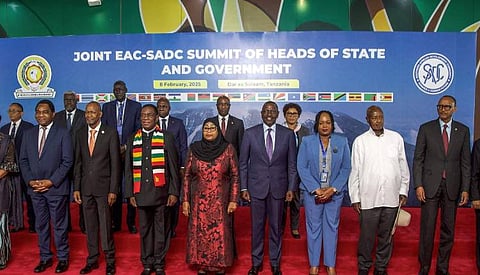
- Home
- Live Blog
- Breaking News
- Top Headlines
- Cities
- NE News
- Sentinel Media
- Sports
- Education
- Jobs

DAR ES SALAAM: African leaders called for an "immediate ceasefire" in the eastern Democratic Republic of the Congo (DRC) and reaffirmed their full support for seeking a lasting solution to the ongoing conflict.
A "historic summit," jointly convened by the East African Community (EAC) and the Southern African Development Community (SADC), two major regional blocs, was held on Saturday in the Tanzanian port city of Dar es Salaam to address the escalating crisis in eastern DRC, the Xinhua news agency reported.
In a final communique, regional leaders called for an "immediate ceasefire" and the restoration of supply lines in the DRC, as the March 23 Movement (M23) has reportedly been advancing toward Bukavu, the capital of South Kivu province, after establishing its so-called administration in Goma, the capital of North Kivu province and a key regional hub.
Recognizing the urgency of the situation, leaders attending the summit directed the EAC-SADC Chiefs of Defence Forces to meet within five days to devise technical measures for enforcing an immediate and unconditional ceasefire. The leaders urged the reopening of traffic routes to restore humanitarian supply lines, particularly the road linking Goma and Bukavu, which has been cut off by the M23 rebellion's advances, and the Goma International Airport, which was severely vandalised during the hostilities.
Political and diplomatic engagement is the most sustainable solution to the conflict in eastern DRC, the communique stated, as regional leaders expressed support for resuming direct negotiations with all state and non-state parties, including the M23, under existing regional mediation frameworks.
Kinshasa has rejected any form of direct negotiations with the M23 but has hinted at reviving the Nairobi Peace Process, a peace initiative led by the EAC and facilitated by former Kenyan President Uhuru Kenyatta.
In the communique, regional countries proposed merging the Nairobi Process with the Luanda Process, a parallel peace mechanism initiated by the African Union and brokered by Angolan President Joao Lourenco.
Both peace mechanisms have faced setbacks. The Nairobi Process has reached an "impasse," according to Kenyatta's spokesperson Kanze Dena, who made the statement on Thursday, while a peace summit under the Luanda Process was abruptly cancelled at the last minute in late December.
To support the merged "Luanda/Nairobi Process," regional leaders suggested appointing additional facilitators, including representatives from other regions of Africa, according to the communique.
The summit was convened to prevent the conflict from escalating into a regional war. "If it continues like this, war risks becoming widespread in the region," Burundian President Evariste Ndayishimiye warned in early February.
The conflict between the M23 and the Congolese government is deeply linked to the aftermath of the 1994 Rwandan genocide and ongoing ethnic tensions, particularly between Tutsi and Hutu populations. The DRC has accused Rwanda of supporting the M23, while Rwanda claims that the DRC's military has allied with the Rwandan rebel group Democratic Forces for the Liberation of Rwanda, which is accused of involvement in the 1994 genocide. (IANS)
Also Read: Freed Israeli hostage unaware wife, daughters were murdered on Oct 7
Also Watch: